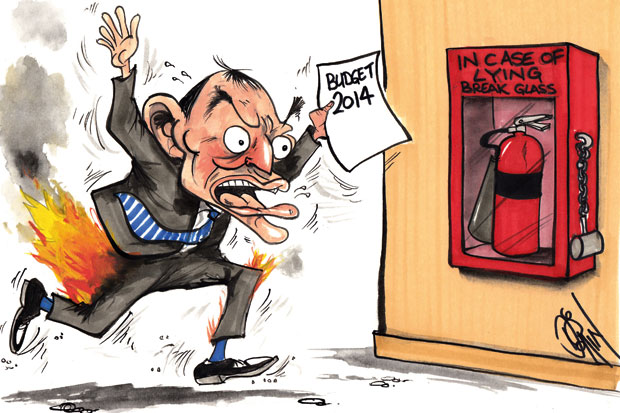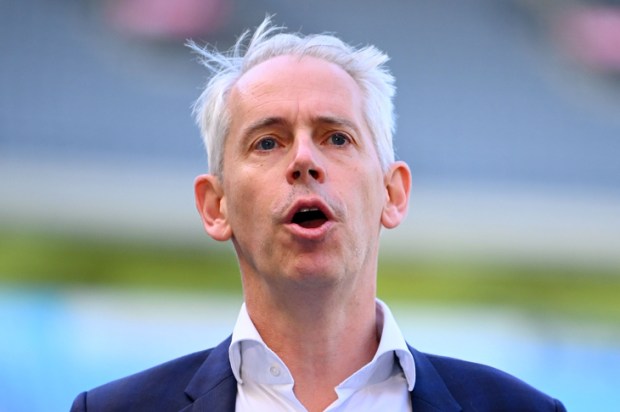I thought Bill Shorten was clever enough not to believe that history repeats itself. But no. Tony Abbott harped on about Julia Gillard’s broken promise and he became prime minister. So Shorten will harp on about Abbott’s broken promises and he will become… not I think prime minister, at least by this route.
In the first place, the promises broken are different as are the circumstances in which they were broken. Gillard’s promise was very specific — there will be no carbon tax — and there was a carbon tax. The tax was held responsible for the rapid rise in energy prices, which hit every householder each time they opened a power bill. As opposition leader, Shorten is refusing to support the repeal of the tax, which allows the government to dub him Electricity Bill.
Abbott’s promise was comprehensive: there will be no new taxes. He now plans to index the fuel excise for inflation, which is scarcely a new tax. The impost will be small and scarcely noticeable, given the regular movement of petrol prices.
The definite new tax is the deficit levy, though it is only to be temporary. It is to be paid by very few people — only those on incomes over $180,000. I know that in principle I should be disturbed at a broken promise, but I admit I was less concerned when I realised that I was not to be a levy-payer.
These measures have the declared purpose of fixing the budget, which is what the Coalition promised to do. That is a purpose readily understood and achievable, unlike an Australian carbon tax designed to stop global warming.
So Abbott’s broken promises on tax are not going to hurt much or be noticed long. If they do fix the budget, much will be forgiven.
Shorten can appeal to us on principle: promises should not be broken, especially by a man who made so much of Gillard’s offence in this regard. But what if we expect promises to be broken by politicians? We would not vote for a politician who promised to raise taxes. So if taxes have to be raised, the only way to manage the business is for politicians to break promises and be despised by the people for doing so.
It would be easier for politicians to be more trustworthy if citizens were more virtuous. But citizens want more services from government and don’t want to pay more taxes to supply them. So politicians have to become liars and dissemblers to keep the ship of state afloat.
The problem may have become more acute in Australia, for which I blame John Hewson who thought he could win office by being honest with the people. At the election of 1993 he campaigned as Liberal leader with a complete programme of new taxes and sale of government assets. The programme included a goods and service tax, which was fiendishly difficult to explain and sell. Labor under Keating opposed the tax, which Keating had previously supported. At a time of double-digit unemployment, Hewson lost the ‘unloseable election’.
When John Howard became Liberal leader he was asked if he would introduce a GST. He replied, no. Not ever?, asked the journalist. Not ever, said Howard. What could he have said? Leaving any wriggle room would have led to a headline: ‘Howard supports GST’. This was regarded as a great coup for the journalist, but it led to a great debasement of political debate. Every tyro journalist now knows the approach: will you promise to rule out this or that for ever? So the affairs of state, unlike any other, are to be predetermined before the circumstances facing governments can be known.
Howard’s promise was so definite and a GST had been so demonised that Howard thought he could introduce a GST only if he took it to an election. He won the election, which makes him a giant among politicians. How many have won office promising a new tax?
This set a very unfortunate precedent. A new tax or a rise in tax should be signalled at an election. At elections journalists — and opponents — will be looking for undertakings that such changes will not be made. This is a recipe for broken promises.
Making promises and keeping them cannot be the formula for successful government. Though John Howard asked the people to free him from the promise against the GST, he introduced into the lexicon ‘core’ and ‘non-core’ promises. The Hawke-Keating government, in my view the best in our history, was a spectacular breaker of promises. I voted for them because they promised not to sell Qantas and the Commonwealth Bank — and was sold down the river. Other policies for which they are now well regarded were never mentioned at an election: the floating of the dollar, the dismantling of tariffs, enterprise bargaining.
This suggests that the Abbott government can survive the breaking of promises so long as its record of achievement is good. Already it has a great achievement to its credit: it has, as promised, stopped the boats of asylum seekers. However much Bill Shorten harps on about Abbott’s broken promises, he will not become prime minister if it looks like the boats would start coming again under a Labor government.
Got something to add? Join the discussion and comment below.
Get 10 issues for just $10
Subscribe to The Spectator Australia today for the next 10 magazine issues, plus full online access, for just $10.
John Hirst has written many history books, the most recent being Looking for Australia: Historical Essays (Black Inc Books).
You might disagree with half of it, but you’ll enjoy reading all of it. Try your first month for free, then just $2 a week for the remainder of your first year.














Comments
Don't miss out
Join the conversation with other Spectator Australia readers. Subscribe to leave a comment.
SUBSCRIBEAlready a subscriber? Log in